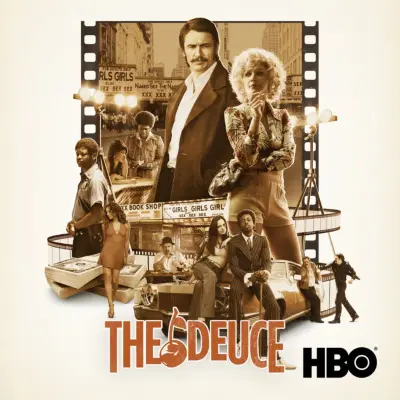The Deuce's time jumps suggest it has a grander endgame in mind
-

David Simon and George Pelecanos’s drama about Times Square, the sex trade and capitalism "seems to be fast-forwarding through history to get to the parts that interest them most: Season one was set in 1971, season two jumped ahead to 1977, and the new third and final season starts in the ramp-up to New Year’s Eve 1984," says Matt Zoller Seitz. "It’s an appropriate strategy for a series that was destined to hit the VHS era eventually, and with the opening credits of season three, bam, here we are. The cutting between images of sex, real estate, and police violence is faster, verging on early MTV; the picture is fuzzier, with moth-size chunks of grain swarming an otherwise clear picture; and the characters who have immersed themselves in a particular type of filmmaking — pornographic, erotic, exploitative — are simultaneously elated and unnerved by the future that has already surrounded them." Seitz adds: "The time jumps on The Deuce suggest that the show has a grander endgame in mind: a portrait of the endless churn of American (or even global) economic history that happens to have Times Square as its focal point. Now that we’re starting to understand the breadth of the canvas, the show feels more like John Dos Passos’s sprawling 'USA trilogy' of novels (a key inspiration on Mad Men) than anything Simon, Pelecanos, and their regular collaborators (including executive producer Nina Kostroff-Noble) have made previously. Contextualizing observations about history, politics, and culture merge (sometimes in a too homework-y way) with down-and-dirty accounts of the characters trying to survive from one day to the next."
ALSO:
- On its new night, The Deuce proves it's the perfect Monday HBO show: "When you look at the shows that have wound up on HBO’s Monday night line-up already a pattern starts to emerge," says Meghan O'Keefe. "These series are more understated than the epic Game of Thrones, more creatively challenging than trendy crowd-pleasers like Big Little Lies. These are old school HBO series, full of envelope-pushing material and somber tones. The Deuce fits better among these dramas than it ever did in the spot reserved for huge genre series like Westworld or the upcoming Watchmen."
- Season 3 ends a magnificent story only TV can tell
- David Simon on setting the final season in 1985: "We’re bouncing toward the beginning of the end of what The Deuce was when it was New York’s Tenderloin, the center of the sex trade in New York. So we chose that year with some care. There are obviously some things that are going to happen in 1985 that are indicative of the changes to come. What would happen to Times Square would happen over time, and it’s still happening. But we’re at least at a place where we can imply the future."
TOPICS: The Deuce, HBO, David Simon, George Pelecanos
More The Deuce on Primetimer:
